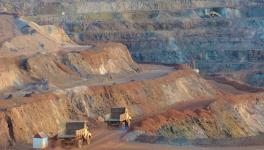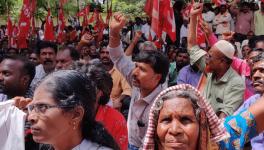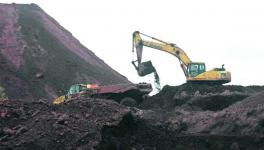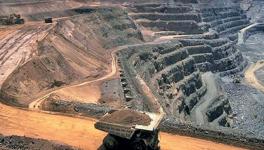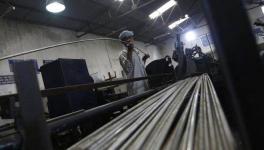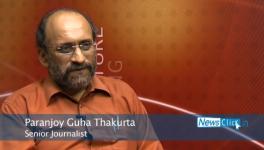Is Govt Losing Revenue on Account of Iron Ore Pellet Exports?
New Delhi: Though a duty of 30% has been imposed by the Union government on export of all grades of iron ore, including fines, which have Fe (iron) content above 58%, no duties whatsoever are imposed on the export of pellets, a value-added product manufactured by agglomerating these fines.
Iron ore pellet exports have continued unabated despite a Union government policy whereby only the state-owned KIOCL Limited, formerly known as Kudremukh Iron Ore Company Limited, or its authorised subsidiaries, is allowed to export these.
A record 12.62 million tonnes of iron ore pellets were exported in 2019-20, up from 9.36 million tonnes in the previous financial year. The value of foreign exchange earned from pellet exports in 2019-20 stood at a record Rs 82,931 crore on the basis of average price of Rs 6,646 per tonne.
Revenue earnings of the government of India from these exports were, however, nil. In the first two months of 2020-21, that is April and May, when the entire nation was under a COVID-19 lockdown imposed by the Central government, approximately 4.01 million tonnes of iron ore pellets were exported.
In 2014, the Congress-led United Progressive Alliance (UPA) government had imposed a 5% export duty on iron ore pellets. But this was rolled back to zero in 2015 by the Bharatiya Janata Party-led National Democratic Alliance (NDA) government through a notification issued by the Central Board of Excise and Customs. The waiver was apparently to allow pellet manufacturers recover their capital investments made to expand capacities. Fines, from which pellets are made, however continued to attract 30% export duty.
An email was sent to the Union Ministry of Steel, headed by cabinet minister Dharmendra Pradhan, on behalf of NewsClick on Monday, September 7, asking as to why iron ore pellets are exempted from any kind of export duty.
The set of queries also includes a question as to the amount of revenues foregone by the Central government in the past five years on account of duty-free exports of iron ore pellets. Besides, a question has also been asked if the Union government intends, if at all, at any time in the future, to bring iron ore fines, lumps and pellets under the same export regulatory regime. The ministry was also asked as to how entities other than KIOCL Limited were exporting iron ore. Ministry officials have assured to provide replies to the queries. However, responses were still awaited at the time of filing this article.
Also read: NMDC’s Trajectory: From Ore Miner to Steel-maker
The government has been, on the other side, providing a duty drawback of 1% on export of pellets. As per figures compiled by the Federation of Indian Mineral Industries (FIMI), the apex body to promote interests of the mining industry, the total value of exports of iron ore pellets between 2013 and 2020 has been Rs 24,896.40 crore, while duty drawbacks paid against these exports stand at Rs 248.96 crore. These figures are exclusive of the value of pellets exported by the Bengaluru-headquartered state-owned KIOCL.
FIMI has written to the Union Steel Ministry last week asking for imposing a total ban on exports of iron ore pellets by any company other than the KIOCL. The Pellet Manufacturers Association of India or PMAI lists 24 companies on its website as its association members out of which seven companies, including KIOCL Limited, are also involved in export activities.
“Only KIOCL or its authorised entities should have been allowed to export iron ore pellets. All pellet exports by entities other than KIOCL are against the law. Only high-grade iron ore fines are being procured for manufacture of pellets while all other grades of the mined material are lying stockpiled, limiting mining lease areas and posing a threat to the environment,” said FIMI Secretary-General RK Sharma.
Earlier, only KIOCL Limited had the authority to export iron ore pellets. However, in September 2014, authorised subsidiaries of KIOCL were also allowed to export. The Ministry of Commerce and Industry had issued an amendment to its own export policy permitting KIOCL “to export its own manufactured iron ore pellets either by itself or through any entity authorised by them for the purpose”.
FIMI has also alleged that the domestic sponge iron manufacturing industry has been suffering due to lack of high-quality iron ore even as exports of value-added pellets have multiplied.
“Due to lifting of only selective high-grade iron ore by domestic steel industry, 162 million tonnes of iron ore stock, with Fe content between 58% and 62%, have been lying unused for decades. Neither are the integrated steel, sponge iron or pellet producers are purchasing this iron ore nor are they allowing it to be exported,” added Sharma.
Last year, the Ministry of Mines had turned down a demand to waive export duty on iron ore with Fe content below 62%, a proposal mooted by the mining lobby to dispose of huge quantities of the accumulated material.
However, there is no official order banning export of iron ore pellets other than those exported by KIOCL Limited or its subsidiaries. Earlier, the Union government had imposed a duty of 7.5% on import of equipment used to manufacture iron ore pellets. However, this import duty is waived for pellet manufacturing units provided they give an undertaking that they would export as much as eight times the amount of money saved in terms of the waiver. This apparently is flagged by exporters as an indication that the Central government has placed no ban on exports.
Recently, domestic sponge iron makers had also written to the Central government asking for restrictions on export of iron ore pellets besides imposition of 30% export duty. Restricting exports would help in bringing down steel prices in the country to affordable levels which, in turn, will help in increasing consumption of steel, the sponge iron manufacturers told the government. Besides, they also argued that unabated export of iron ore pellets will restrict India’s target of achieving 300 million tonnes of steel capacity in the next 10 years, in accordance with the spirit of the National Steel Policy, 2017.
Also read: Thermal Power Plants Miss Emissions Deadline Even as RBI Flags Concerns Over Climate Change
The PMAI, however, denied any shortage of iron ore pellets for domestic steel and sponge iron industries. As per figures provided by PMAI, there is a capacity of 89.47 million tonnes in the country for production of iron ore pellets. However, only 69.45 million tonnes of pellets were produced in 2019-20, out of which 12.45 million tonnes were exported. Domestic sale of pellets accounted for approximately 56.97 million tonnes.
“Export of pellets was done after meeting full requirements of domestic industry. Even after exports, there was unutilised capacity,” said PMAI Secretary-General Deepak Bhatnagar.
Under-utilisation of pellet manufacturing capacity has apparently resulted in losses to the industry. Capacity utilisation was only 78% last financial year. Pellet manufacturers are of the opinion that export encouragement by providing 5% duty drawback, as compared to the prevalent rate of 1%, could result in full capacity utilisation. Besides, availability of iron ore at reasonable price has also been a major concern of pellet manufacturers.
The writer is an independent journalist.
Get the latest reports & analysis with people's perspective on Protests, movements & deep analytical videos, discussions of the current affairs in your Telegram app. Subscribe to NewsClick's Telegram channel & get Real-Time updates on stories, as they get published on our website.









